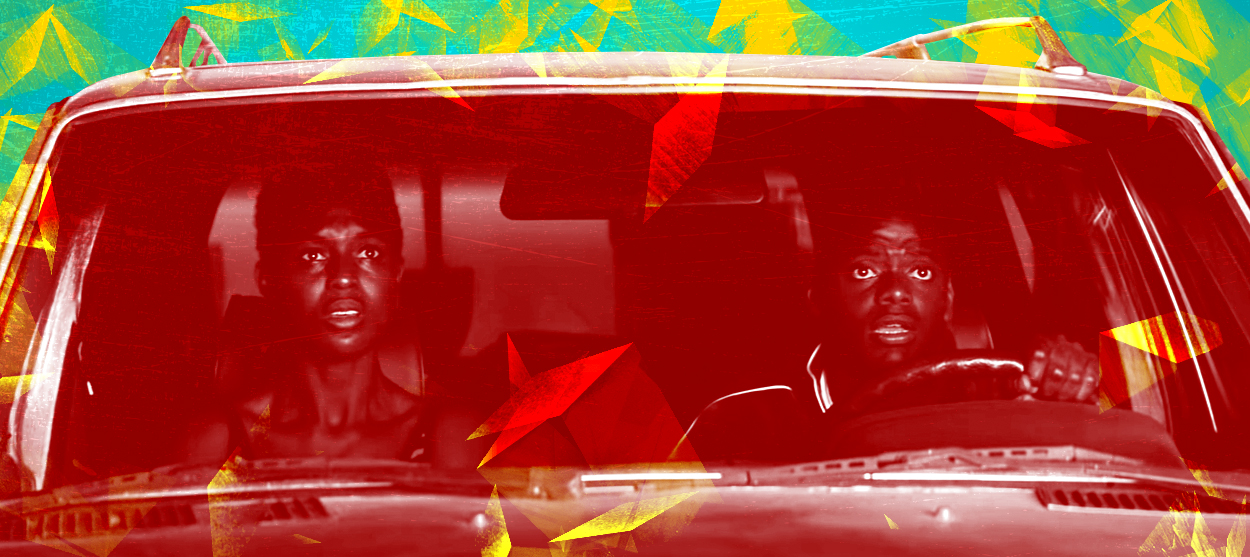Queen & Slim shows Hollywood is still learning how to grapple with police shootings
But they are learning


A free daily email with the biggest news stories of the day – and the best features from TheWeek.com
You are now subscribed
Your newsletter sign-up was successful
In the recent police thriller 21 Bridges, Chadwick Boseman plays a police officer known, informally, as a killer of cop-killers — a man who will not hesitate when it comes to shooting down suspects if necessary. The story pays some lip service to the notion that police are themselves in need of stricter policing, but couches it in the usual material about a few bad-guy cops who are unambiguously corrupt (as opposed to systemically biased and racially motivated).
If this entertaining B-movie felt a little out of step, it's partially because traditional police heroes provoke an increasingly complicated reaction from audiences — and partially because Hollywood filmmakers have seemingly begun to understand the troubling regularity of real-life police shootings. Queen & Slim, opening nationwide this week, just five days after 21 Bridges, doesn't just hint at this dynamic; it's the film's inciting incident.
One of the most valuable and upsetting details about Queen & Slim is how that incident interrupts the movie's initial narrative, and turns it into another genre entirely. The story starts off as a sweet, low-key romantic drama, maybe even a light comedy: A lawyer (Jodie Turner-Smith) goes on a belated Tinder date with a man (Daniel Kaluuya) who, we learn, first messaged her weeks ago. (Their names are not given until the end, and their titular nicknames don't ever appear beyond the credits.) The pair shares a certain playful, wary rapport, expressing some odd-couple attraction while remaining skeptical about actual second-date prospects — her, especially.
The Week
Escape your echo chamber. Get the facts behind the news, plus analysis from multiple perspectives.

Sign up for The Week's Free Newsletters
From our morning news briefing to a weekly Good News Newsletter, get the best of The Week delivered directly to your inbox.
From our morning news briefing to a weekly Good News Newsletter, get the best of The Week delivered directly to your inbox.
Relaxed yet spiky dialogue from Emmy-winning writer Lena Waithe, rich cinematography by Tat Radcliffe, and strong performances from both actors immediately create a lived-in atmosphere. But the end of the characters' night is interrupted by a "routine" traffic stop that quickly escalates with queasy familiarity. The cop pulls a gun for no good reason, and fires on an unarmed non-suspect. After a self-defense scramble, it's the police officer who winds up dead. Slim thinks they should turn themselves in; Queen convinces him that it would be suicide, and they go on the run. Institutional racism turns a grounded, melancholy flirtation into a lovers-on-the-run story.
It's fascinating to see Waithe and director Melina Matsoukas (who worked with Waithe on Master of None, and has made an impressive array of music videos) mix that particular subgenre with socially conscious drama. At its best, the movie extends a sense of generosity and humanity toward a variety of characters the sorta-couple encounters on their journey. This is a movie that acknowledges the tragedies of life as a black person in the United States, without becoming a lecture.
At the same time, Queen & Slim doesn't feel fully equipped to grapple with the issues it raises. Really, why should it? Part of the narrative is very much about how these characters shouldn't have to grapple with what has happened to them — that it's an infringement, and that it forces them to find fleeting pleasures and solace in the margins of American life, with their future turned into a giant question mark. Their whole relationship has to play out under unimaginable stress and threats. But sometimes Matsoukas' attempts to bring that simmering tension to a boil are awkward, as when she intercuts a sex scene with a protest of police violence.
Queen and Slim have protestors on their side because the public sees body-cam video footage that shows them clearly acting in self-defense, even if it doesn't exonerate them in the eyes of the law. It's this social-movement plot point that the movie stumbles over — understandably. Regardless of the obvious talent on hand, it's just plain difficult for any fictional story to gracefully turn its characters into folk heroes. Giving made-up characters thousands of anonymous supporters has a veneer of distracting phoniness, even when it's more or less plausible; suddenly, the movie is trying to speak for an enormous part of the population, instead of the complicated people it has spent time developing. Here, one particular attempt to bring a supporting character into that subplot quickly amps up into melodrama that the movie doesn't have time or inclination to resolve. The protest scenes evoke Black Lives Matter without discussing that movement directly, or saying much of anything about it beyond the implication that it's obviously necessary.
A free daily email with the biggest news stories of the day – and the best features from TheWeek.com
Queen & Slim is the latest of several recent movies trying to come to grips with the horrors of racially motivated police violence. Last year's Widows used a police shooting for a crucial bit of backstory, and rode a line between relevance and exploitation (appropriate for its overall genre-meets-sociology approach). Blindspotting, also from 2018, makes stronger use of this (real-life) trope, by exploring its psychological effects on a witness to the crime in question. Police misconduct, body cams, and complicated racial dynamics are now practically required elements of cop thrillers like the aforementioned 21 Bridges and the recent Black & Blue.
In this context, Queen & Slim is notable for its directness. It doesn't pull its punches by using a shooting as a plot decoration, playing up Crash-style "misunderstandings," or dealing with more widespread (and far more movie-ish) police corruption schemes. But that same directness gradually eliminates the breathing room that gives the film so much life and detail early on. Its story gets bigger, but less effective. The movie's craftsmanship, good intentions, and muted impact are all reminiscent of the dramas Hollywood made about the Iraq War throughout the 2000s: There's a sense of the filmmakers urgently wanting to address something happening before our eyes, and not necessarily knowing how. It's urgent, but also an obligation. Maybe it's appropriate that the story's increased scale starts to feel like an unnatural, unwieldy burden.
Want more essential commentary and analysis like this delivered straight to your inbox? Sign up for The Week's "Today's best articles" newsletter here.
Jesse Hassenger's film and culture criticism has appeared in The Onion's A.V. Club, Brooklyn Magazine, and Men's Journal online, among others. He lives in Brooklyn, where he also writes fiction, edits textbooks, and helps run SportsAlcohol.com, a pop culture blog and podcast.
-
 The ‘ravenous’ demand for Cornish minerals
The ‘ravenous’ demand for Cornish mineralsUnder the Radar Growing need for critical minerals to power tech has intensified ‘appetite’ for lithium, which could be a ‘huge boon’ for local economy
-
 Why are election experts taking Trump’s midterm threats seriously?
Why are election experts taking Trump’s midterm threats seriously?IN THE SPOTLIGHT As the president muses about polling place deployments and a centralized electoral system aimed at one-party control, lawmakers are taking this administration at its word
-
 ‘Restaurateurs have become millionaires’
‘Restaurateurs have become millionaires’Instant Opinion Opinion, comment and editorials of the day
